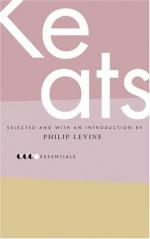|
This section contains 7,120 words (approx. 24 pages at 300 words per page) |

|
SOURCE: "Why 'Nothing is Past': Philip Levine's Conversation with History," in Private Poets, Worldly Acts: Public and Private History in Contemporary American Poetry, Ohio University Press, 1996, pp. 71-89.
In the following essay, originally published in Boulevard, Volumes 25 and 26, Stein discusses Levine's historical consciousness. He analyzes Levine's insistence that the past is in constant dialogue with the present and that people and events of the past continue to mold those of today and of the future.
Three-quarters of the way through Philip Levine's "The Present," a poem recounting the bloody memory of what happened when "Froggy Frenchman" fell from a high pallet at work, Levine shares a secret with his readers, "I began this poem in the present / because nothing is past." On a rhetorical level, Levine addresses his readers merely to let them know why, given the possibilities available to him, he chose present tense for a poem...
|
This section contains 7,120 words (approx. 24 pages at 300 words per page) |

|


